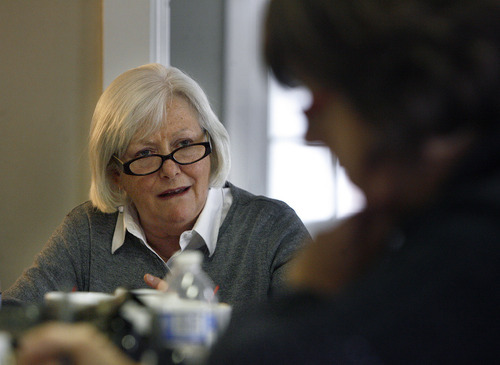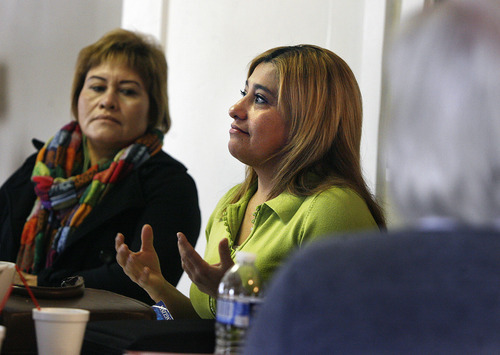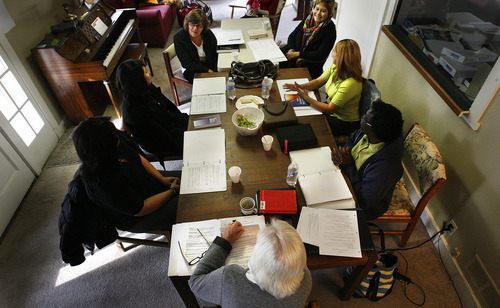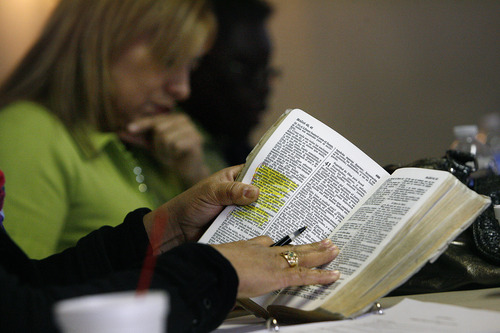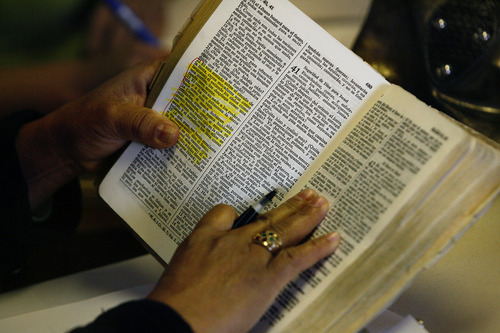This is an archived article that was published on sltrib.com in 2011, and information in the article may be outdated. It is provided only for personal research purposes and may not be reprinted.
The soft-spoken South Sudanese pastor sits at a table in a Salt Lake City living room on a Monday morning, talking about reconciliation.
A woman, Margaret Duku explains, had stopped attending Christ for the Nations Christian Church, made up mostly of refugees from South Sudan, because two others had offended her. So Duku arranged for the three to meet, hash out the problem and offer apologies all around.
"If you are a door blocking people from coming to God," Duku told them, "it's not good."
The women cried. They hugged. They said a prayer of mutual forgiveness.
It was all part of a homework assignment Duku got in her peer-learning class, where students explore Christian teaching and scriptures, then go into their communities to put their principles into practice.
The weekly class, "Caring for God's People," is sponsored by The Vine Institute, the latest incarnation of the Salt Lake Theological Seminary, whose mission continues to be Christian leadership training.
But unlike the seminary, Vine focuses less on theology and clergy accreditation and more on developing practical skills for lay leaders, especially in refugee and immigrant communities.
After the seminary ceased operations in 2008, a few staffers "prayed and thought about whether it was time to dissolve the corporation and celebrate what God had done for 25 years," recalls Tom McClenahan, Vine's executive director, "or whether there was something left to do with the seminary's library, resources and experience."
The remaining staffers, including McClenahan, David Rowe and Liz Micka, became aware of the "changing face" of Utah's Christian community, particularly pockets of believers from many countries.
Most of them met in homes, apartment complex recreation rooms or church buildings late in the afternoon or evening when no one else was around, McClenahan says. "They are not very visible, but there are lots of them."
Pastors and lay leaders in these ethnic congregations often have little pastoral training and even fewer interactions with other Christians, so McClenahan and the others decided to offer their expertise to these newcomers and to help them become advocates for their people.
"We want to walk alongside them, to learn their best practices and help adapt them to their [new] cultural situation," he says. "We want to help them become aware of how those in other cultures deal with the same issues."
Once the remaining seminary staffers decided that God wanted them to minister to these populations, the next challenge was to find a curriculum that would serve their needs and bridge cultural boundaries.
They found one that started in Kenya and is now used in more than 50 nations.
—
How it works • Each weekly class tackles a Christian principle, including guidance, healing, comfort, dealing with crises, healing and "visiting in Christ's name."
The session begins with a report much like Duku's of the previous week's assignment, then the other students add their experiences.
On this Monday, Mary Flores, originally from Colombia, describes her exchange with a young father who had returned to his life of drugs. Silvia Bayani, a Mexican married to an Iranian, tells about the gift of a cow after a dispute was settled. U.S.-born Liliana Figueroa mentions a difficult personal relationship, saying she would pray about it.
"Reconciliation doesn't always make people feel good about themselves," says Micka, a Vine Institute staffer. "It can be difficult."
Next, the students take turns reading biblical passages relating to the topic of the day: pastoral care in times of crisis. They talk about war, famine, political instability and disease outbreaks such as AIDS, malaria and diphtheria. Each describes the problems in her own country or, in Duku's case, life as a refugee in Egypt.
Then the facilitator, in this case Kay Rudd, helps draw a connection between their experiences in their home countries and now in Utah, allowing them to see how they can apply the lessons to various cultural challenges.
Growing up in Utah, Latina Laura Figueroa has never faced such severe conditions, she says, but adds, "Our health crisis is STDs [sexually transmitted diseases]."
Vine students agree that helping the sick and those in need is not just the pastor's responsibility.
"Sometimes we, as Christians, say trust God and you'll be OK," Rudd says. "But sometimes they need help from other humans."
The students then make and share their action plans for the next week.
The class ends with the seven women joining hands in prayer.
—
The wider vision • The class, which costs $100 a term (though most students receive scholarships from donors), is only part of the institute's mission.
It also stages festivals and luncheons, multicultural worship services and celebrations, discussions, lectures and learning — all with the aim of cross-cultural pollination among Christians from various countries.
During one class last year, for example, the group discussed the meaning of "praise."
Two Tongan students said in their language it meant "to lift up" and that repeating it several times gave it a profound emphasis, like saying, "lift up and lift up again."
An Anglo student then turned this "colorful linguistic morsel into a children's sermon about praising God," McClenahan reports, where he "visually demonstrates it by picking up his daughter and holding her about chest high at first, then lifting her up further above his shoulders, picturing 'lift up and lift up again.' "
"This is what we do as a church, when we praise God," he told them, "we lift him higher and higher, exalting him as high as we possibly can."
Such exchanges exemplify Vine's hopes.
"We want to bring people of different nations, languages and [ethnic] groups to worship together, work together and grow in trusting one another," McClenahan says, "not to the extent that they lose their cultural identities but that they enrich the whole."
Rather than a Christian "melting pot" — with everyone tossed into one dominant way of worshipping, while smaller, non-American churches or "ingredients" lose their "distinctive flavor" — he prefers to think about a "salad bowl" in which various foods (churches) combine into a single dish but each element retains "its unique color, flavor and texture."
The Vine Institute, McClenahan says, is not looking to assimilate immigrants into a dominant church but to enrich the Christian experience in Utah with lots of fresh insights and cultural "ingredients."
About the institute
The Vine Institute is the latest incarnation of the Utah Institute for Biblical Studies, which was founded in 1984 to equip men and women to share the Christian faith amid state's increasing cultural diversity. The school expanded its programs in 1998 to include graduate degrees and was renamed the Salt Lake Theological Seminary. The seminary ceased operations in 2008 but did not dissolve its nonprofit organization.
In 2010, the school began legally "doing business as" The Vine Institute, a multidenominational, diversified, decentralized, educational network serving developing leaders in Utah's established churches as well as refugee and immigrant church communities. The institute continues the ongoing vision for Christian leadership training that includes formative mentoring. The mission is "Networking the Christian community for effective collaborative leadership."
Source: http://vine-institute.org/about/


